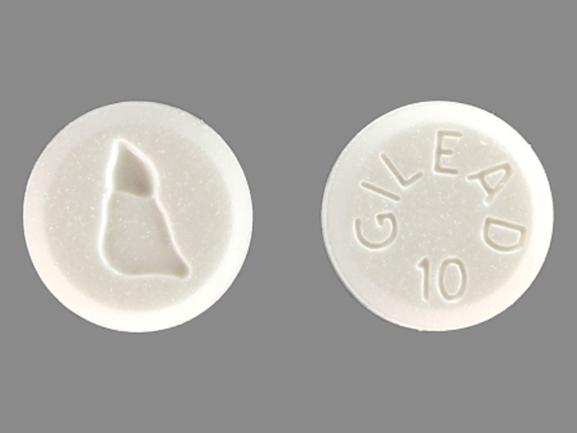Hepsera
Generic name: adefovir [ a-DEF-oh-vir ]
Drug class: Nucleoside reverse transcriptase inhibitors (NRTIs)
What is Hepsera?
Hepsera is an antiviral medicine that is used to treat chronic hepatitis B in adults and children at least 12 years old. This medicine is not a cure for chronic hepatitis B.
Hepsera may also be used for purposes not listed in this medication guide.
Hepsera side effects
Get emergency medical help if you have signs of an allergic reaction: hives; difficult breathing; swelling of your face, lips, tongue, or throat.
Mild symptoms of lactic acidosis may worsen over time, and this condition can be fatal. Get emergency medical help if you have: unusual muscle pain, trouble breathing, stomach pain, vomiting, irregular heart rate, dizziness, feeling cold, or feeling very weak or tired.
Hepsera may cause serious side effects. Call your doctor at once if you have:
-
kidney problems--little or no urination, swelling in your feet or ankles, feeling tired or short of breath; or
-
liver problems--nausea, loss of appetite, stomach pain (upper right side), dark urine, jaundice (yellowing of the skin or eyes).
Common side effects of Hepsera may include:
-
stomach pain, nausea;
-
weakness; or
This is not a complete list of side effects and others may occur. Call your doctor for medical advice about side effects. You may report side effects to FDA at 1-800-FDA-1088.
Related/similar drugs
Warnings
You may need to be tested for HIV before you start taking Hepsera. Tell your doctor if you have been exposed to HIV, or if you have untreated HIV or AIDS.
Call your doctor at once if you have liver symptoms such as right-sided upper stomach pain, nausea, loss of appetite, dark urine, or yellowing of your skin or eyes.
Hepsera can harm your kidneys, especially if you already have kidney problems or take certain medicines.
You may develop lactic acidosis, a dangerous build-up of lactic acid in your blood. Call your doctor or get emergency medical help if you have unusual muscle pain, trouble breathing, stomach pain, dizziness, feeling cold, or feeling very weak or tired.
Hepatitis B may become active or get worse after you stop using Hepsera. You may need frequent liver function tests for several months.
Before taking this medicine
You should not take Hepsera if you are allergic to it.
You should not take Hepsera if you also medicine that contains tenofovir (Atripla, Biktarvy, Cimduo, Complera, Delstrigo, Descovy, Genvoya, Stribild, Symfi, Truvada, or Viread).
Tell your doctor if you have kidney disease or if you are on dialysis.
Tell your doctor if you have been exposed to HIV, or if you have untreated HIV or AIDS. Taking medicines to treat chronic hepatitis B can cause HIV infection to become resistant to the standard HIV and AIDS medications. You may need to be tested for HIV before you start taking Hepsera.
You may develop lactic acidosis, a dangerous build-up of lactic acid in your blood. This may be more likely if you have other medical conditions, if you've taken antiviral medication for a long time, or if you are a woman. Ask your doctor about your risk.
Tell your doctor if you are pregnant or breastfeeding. If you are pregnant, your name may be listed on a pregnancy registry to track the effects of adefovir on the baby.
Hepsera is not approved for use by anyone younger than 12 years old.
How should I take Hepsera?
Follow all directions on your prescription label and read all medication guides or instruction sheets. Use the medicine exactly as directed.
Take the medicine at the same time each day, with or without food.
Do not change your dose or stop using Hepsera without your doctor's advice.
You will need frequent medical tests.
Store at room temperature away from moisture and heat. Keep the tablets in their original container, along with the packet or canister of moisture-absorbing preservative.
Hepatitis B may become active or get worse in the months after you stop using Hepsera. You may need frequent liver function tests while using this medicine and for several months after your last dose.
What happens if I miss a dose?
Take the medicine as soon as you can, but skip the missed dose if it is almost time for your next dose. Do not take two doses at one time.
Get your prescription refilled before you run out of medicine completely.
What happens if I overdose?
Seek emergency medical attention or call the Poison Help line at 1-800-222-1222.
What should I avoid while taking Hepsera?
Using Hepsera will not prevent your disease from spreading. Talk with your doctor about safe ways to prevent transmission during sex. Sharing drug or medicine needles is never safe, even for a healthy person.
What other drugs will affect Hepsera?
Hepsera can harm your kidneys, especially if you also use certain medicines for infections, cancer, osteoporosis, organ transplant rejection, bowel disorders, high blood pressure, or pain or arthritis (including Advil, Motrin, and Aleve).
Other drugs may affect Hepsera, including prescription and over-the-counter medicines, vitamins, and herbal products. Tell your doctor about all your current medicines and any medicine you start or stop using.
More about Hepsera (adefovir)
- Check interactions
- Compare alternatives
- Drug images
- Side effects
- Dosage information
- During pregnancy
- Drug class: nucleoside reverse transcriptase inhibitors (NRTIs)
- Breastfeeding
- En español
Patient resources
Professional resources
Related treatment guides
Further information
Remember, keep this and all other medicines out of the reach of children, never share your medicines with others, and use this medication only for the indication prescribed.
Always consult your healthcare provider to ensure the information displayed on this page applies to your personal circumstances.
Copyright 1996-2025 Cerner Multum, Inc. Version: 9.02.

